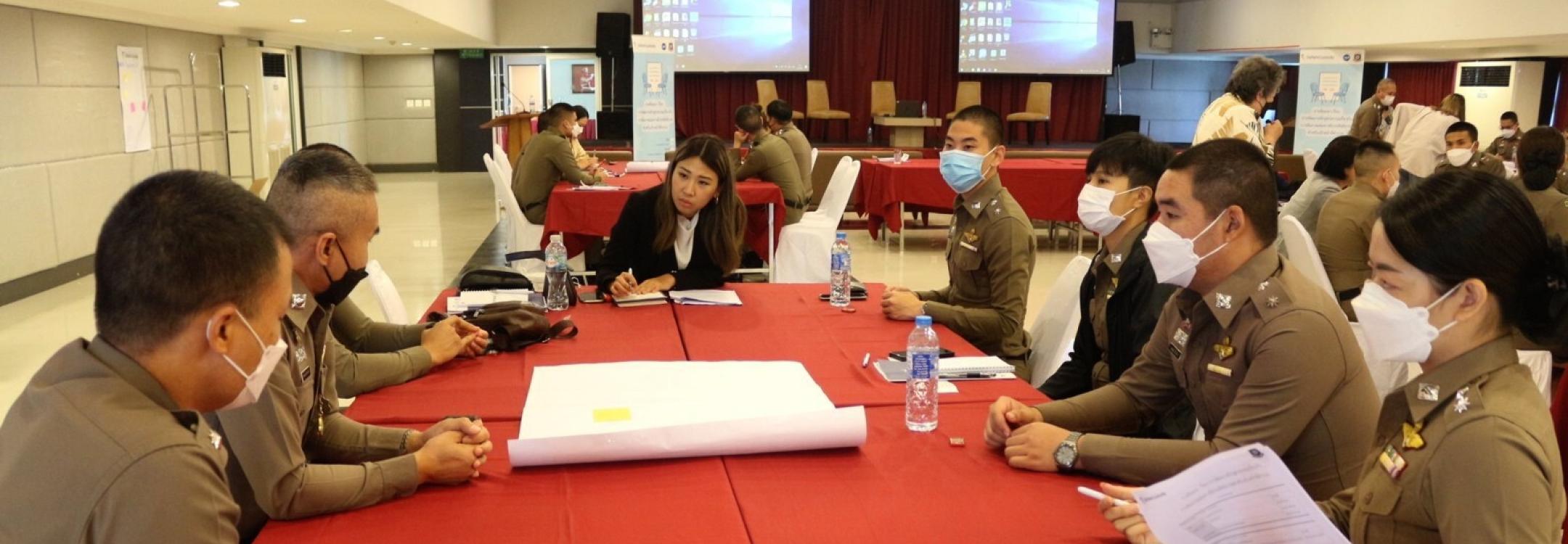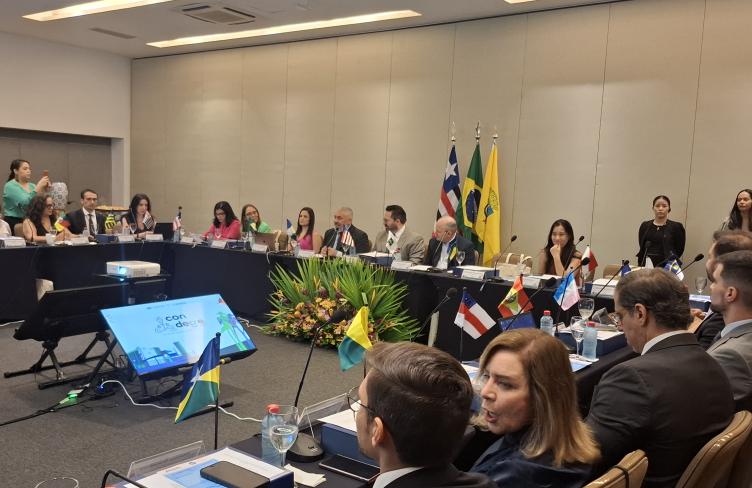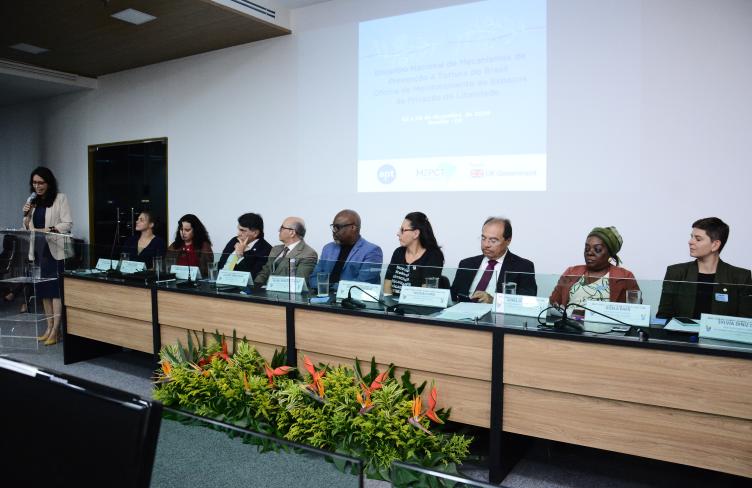
(Thai version below)
Today – 22 February 2024 – marks the first anniversary of the Prevention and Suppression of Torture and Enforced Disappearance Act B.E. 2565 (the anti-torture law) entering into force in Thailand.
The passage of the legislation was a milestone for the nation in implementing its obligations under the UN Convention Against Torture (UNCAT).
“One year on, we can see just how much this law has helped shift actions and attitudes in Thailand,” APT Secretary General Barbara Bernath said.
On the international stage, Thailand has withdrawn the interpretive declarations of articles 1 (definition of torture), 4 (criminalisation of torture), and 15 (jurisdiction over torture) under the UNCAT.
At the national level, the new law has helped galvanise the country's commitment to preventing and responding to torture. A recent case involving a man who confessed to the murder of his wife, allegedly due to coercion from Thai law enforcement, has put a spotlight on the issue of confession-driven interrogation and the use of torture.
As Thailand reflects on the progress over the past twelve months to implement its anti-torture law, the journey toward ensuring the safety and rights of individuals in custody must continue.
According to media reports, a woman's body was found in a pond in Aranyaphrathet, Thailand, on 12 January 2024. The woman's husband was promptly arrested by the police and admitted to the crime on the same day. However, investigative journalists uncovered a different story. CCTV footage from the area recorded five teenagers committing the murder and disposing of the body in the pond. One of the teenagers was the son of a police officer.
The woman's husband subsequently claimed that coercion – including forced stripping, ankle chaining, and the threat of suffocation with a plastic bag – was employed during his interrogation.
In response to the man’s allegation, Thailand’s Department of Special Investigations (DSI) responded swiftly and were able to use the special mandate under the anti-torture law.
Mr Angsuket Visuthvatanasak, Director of the Bureau of Justice Enforcement Affairs within the DSI, told the APT that the DSI will coordinate with relevant authorities to ensure transparency in the legal proceedings against the police officers in accordance with the anti-torture law.
To complement Thailand’s anti-torture legislation, it is clear that there remains a need to fully implement legal and procedural safeguards during police custody, as provided by the Principles on Effective Interviewing for Investigations and Information Gathering, also known as the Méndez Principles.
This includes moving away from coercive interrogation methods towards investigative interviewing, to implement audio and video recording of interviews, and put in place a system monitoring places of detention.
Thailand has joined with more than 60 other States at the UN General Assembly to express support for the Méndez Principles.
In recent years, the APT has worked with authorities in Thailand to build torture prevention knowledge and capabilities, including delivering workshops on the Méndez Principles with the Royal Police Cadet Academy (RPCA) and other law enforcement.
Building on this collaboration, Pol.Lt.Col. Kiattisak Chanjana from the RPCA highlighted the institution's commitment to developing a police interview training curriculum aligned with the obligations of the anti-torture law, emphasising the importance of new recruits adopting an approach that strictly opposes the use of torture in investigative practices.
In March, the APT will organise a training-of-trainers workshop, in collaboration with the RCPA and New Zealand Police, focusing on rapport-based interviewing.
In addition, the APT recently convened a national dialogue in Thailand on ratification of the Optional Protocol to the UN Convention against Torture (OPCAT) which, among other things, creates a system for regular and announced visits to places of detention, including police stations.
The national dialogue - hosted on 9 February 2024, in partnership with Thailand’s Rights and Liberties Protection Department and OHCHR – brought together representatives from more than 26 different government institutions.
The APT also collaborated with the National Human Rights Commission of Thailand, conducting sessions to deepen understanding of OPCAT principles and monitoring methodology.
“Our work with Thai authorities and law enforcement has highlighted a genuine desire among many actors to pursue practical changes across the country’s criminal justice system. The APT will continue to support the efforts of Thailand so that every person can be safe in custody,” Ms Bernath said.
ประเทศไทย: ทบทวนบทบาทของกฎหมายต่อต้านการทรมานในหนึ่งปีที่ผ่านมา
วันที่ 22 กุมภาพันธ์ 2567 ถือเป็นวันครบรอบหนึ่งปีของการบังคับใช้ พระราชบัญญัติป้องกันและปราบปรามการทรมานและการบังคับบุคคลให้สูญหาย พ.ศ. 2565 (กฎหมายต่อต้านการทรมาน) ในประเทศไทย การบังคับใช้กฎหมายดังกล่าวถือเป็นก้าวสำคัญของประเทศในการดำเนินการตามพันธกรณีภายใต้อนุสัญญาต่อต้านการทรมานของสหประชาชาติ (UNCAT)
“ในหนึ่งปีที่ผ่านมา เราจะเห็นได้ว่ากฎหมายฉบับนี้เป็นตัวขับเคลื่อนด้านการบังคับใช้หลักประกันสิทธิขั้นพื้นฐาน (safeguards) ให้กับประชาชนอย่างเข้มงวด ทั้งทัศนคติของผู้มีอำนาจทางกฎหมายยังมีความก้าวหน้าขึ้น” บาร์บารา เบอร์นาธ เลขาธิการ APT
ในเวทีระหว่างประเทศ ประเทศไทยได้ถอนคำแถลงตีความ (the interpretative declation) ในข้อบทที่ 1 (คำนิยามการทรมาน) ข้อบทที่ 4 (การกำหนดให้การพยายาม การสมรู้ร่วมคิด และการมีส่วนร่วมในการกระทำทรมานเป็นความผิดที่ลงโทษได้ตามกฎหมายอาญา) และข้อบทที่ 5 (เขตอำนาจศาลสากลเหนือความผิดฐานกระทำทรมาน) อย่างเป็นทางการ โดยองค์การสหประชาชาติได้แจ้งเวียนตราสารดังกล่าวของไทยแล้ว และกำหนดให้มีผลใช้บังคับตั้งแต่วันที่ 15 กันยายน 2566 เป็นต้นไป
ในส่วนของการบังคับใช้กฎหมายต่อต้านการทรมานในระดับชาติ พระราชบัญญัติฉบับนี้ได้ผลักดันให้เจ้าหน้าที่ผู้มีส่วนเกี่ยวข้องทำงานอย่างแข็งขันในการป้องกันและปราบปรามการซ้อมทรมาน
“ในขณะที่ประเทศไทยมีความก้าวหน้าในการบังคับใช้กฎหมายต่อต้านการทรมานในช่วง 12 เดือนที่ผ่านมา ผู้มีส่วนเกี่ยวข้องจะต้องไม่ลืมว่า รัฐยังจะต้องมุ่งเน้นการใช้หลักประกัันสิทธิขั้นพื้นฐาน เช่น สิทธิในการเข้าถึงญาติ ทนาย และแพทย์ ให้แก่บุคคลที่ถูกควบคุมตัวควบคู่กันไป ” บาร์บารา เบอร์นาธ เลขาธิการ APT
ในช่วงเดือนมกราคม พ.ศ. 2567 มีการรายงานข่าวเกี่ยวกับคดีฆาตรกรรม หญิงสาววัย 47 ปี โดยศพของผู้หญิงคนดังกล่าวถูกพบที่สระน้ำข้างโรงเรียนในพื้นที่ ในอำเภออรัญประเทศ จังหวัดสระแก้ว โดยสามีของผู้ตายมาพบเจ้าหน้าที่ตำรวจและให้การรับสารภาพว่าตนเองเป็นผู้ก่อเหตุทำร้ายร่างกายภรรยาจนเสียชีวิต
อย่างไรก็ตาม สื่อมวลชนแห่งหนึ่งได้ทำการค้นหาความจริง และพบข้อมูลเพิ่มเติมหลังจากการตรวจสอบกล้องวงจรปิดด้านหน้าทางเข้าข้างสถานีตำรวจภูธร อำเภออรัญประเทศ และโรงพยาบาลอรัญประเทศ พบผู้ก่อเหตุที่แท้จริงเป็นกลุ่มวัยรุ่น 5 คน อายุระหว่าง 13-16 ปี ที่เข้าทำร้ายหญิงสาววัย 47 ปีและนำร่างไปทิ้งสระน้ำจนเสียชีวิต โดยหนึ่งในกลุ่มวัยรุ่นนี้ เป็นบุตรชายของเจ้าหน้าที่ตำรวจเจ้าของคดี
ต่อมาสามีของหญิงที่เสียชีวิตได้รับการปล่อยตัว และให้สัมภาษณ์กับสื่อมวลชนถึงสาเหตุที่ยอมรับสารภาพ โดยอ้างว่ามีการใช้การบังคับทางร่างกาย เช่น การบังคับเปลื้องผ้า การผูกข้อเท้า และการขู่ว่าจะทำให้หายใจไม่ออกด้วยการคลุมถุงพลาสติก ในระหว่างการสอบสวนของเขา
ในการนี้ กรมสอบสวนคดีพิเศษ (DSI) ของประเทศไทยเห็นถึงความสำคัญของคดี จึงได้ใช้อำนาจภายใต้กฎหมายต่อต้านการทรมานได้ในมาตรา 31 ที่ระบุให้อำนาจสอบสวนกับกรมสอบสวนคดีพิเศษ โดยดีเอสไอจะเสนอเรื่องผ่านรัฐมนตรีว่าการกระทรวงยุติธรรม จากนั้นจึงจะมีการสอบสวนร่วมกันทั้ง 4 หน่วยงานตามมาตรา 31 เพื่อให้เกิดความโปร่งใส
นายอังศุเกศ วิสุทธิวัฒนศักดิ์ ผู้อำนวยการกองกิจการอำนวยความยุติธรรม ของ DSI กล่าวกับ APT ว่า DSI จะประสานงานกับหน่วยงานที่เกี่ยวข้องเพื่อความโปร่งใสในการดำเนินคดีกับเจ้าหน้าที่ตำรวจตามกฎหมายต่อต้านการทรมาน โดยกระบวนการจะต้องดำเนินการให้เป็นไปตามกฎหมาย เพื่อส่งเสริมการบังคับใช้กฎหมายต่อต้านการทรมานของประเทศไทย
จากกรณีดังกล่าว เห็นได้ชัดว่าประเทศไทยยังคงมีความจำเป็นที่จะต้องใช้มาตรการคุ้มครองทางกฎหมายและกระบวนการอย่างเต็มที่ในระหว่างการควบคุมตัวของเจ้าหน้าที่ตำรวจ ดังที่ระบุในหลักการว่าด้วยการสัมภาษณ์อย่างมีประสิทธิผลเพื่อการสืบสวนและการรวบรวมข้อมูล หรือที่เรียกว่าหลักการเมนเดซ ที่มุ่งเน้นการยกเลิกวิธีการสืบสวนสอบสวนเชิงบีบบังคับไปสู่การสัมภาษณ์เพื่อค้นหาความจริง (investigative interviewing) โดยให้ความสำคัญกับการบันทึกภาพและเสียงในระหว่างการสัมภาษณ์ และจัดให้มีระบบตรวจสอบที่โปร่งใสในสถานที่ควบคุมตัว
สำหรับประเทศไทยได้เข้าร่วมกับรัฐอื่นๆ มากกว่า 60 รัฐในสมัชชาใหญ่แห่งสหประชาชาติเพื่อแสดงการสนับสนุนหลักการเมนเดซ
APT ได้ทำงานร่วมกับหน่วยงานรัฐในประเทศไทยเพื่อเสริมสร้างความรู้ในการป้องกันการทรมาน รวมถึงการจัดอบรมเชิงปฏิบัติการเกี่ยวกับหลักการเมนเดซร่วมกับโรงเรียนนายร้อยตำรวจ และหน่วยงานบังคับใช้กฎหมายอื่นๆ
จากความร่วมมือครั้งนี้ พ.ต.ท. เกียรติศักดิ์ จันจะนะ อาจารย์คณะนิติศาสตร์ โรงเรียนนายร้อยตำรวจ เน้นย้ำถึงความมุ่งมั่นของสถาบันในการพัฒนาหลักสูตรฝึกอบรมการสัมภาษณ์ของเจ้าหน้าตำรวจให้สอดคล้องกับการบังคับใช้กฎหมายต่อต้านการทรมาน โดยเน้นย้ำถึงความสำคัญในการสร้างตำรวจรุ่นใหม่ให้มีทัศนคติและทักษะความรู้ในการนำแนวทางที่ต่อต้านการใช้การทรมานในการสืบสวนสอบสวนอย่างเคร่งครัด
ในเดือนมีนาคมที่จะถึงนี้ APT จะจัดการสัมมนาการฝึกอบรมผู้ฝึกสอนการสืบสวนสอบสวนอีกครั้ง โดยเป็นความร่วมมือระหว่าง APT โรงเรียนนายร้อยตำรวจและตำรวจนิวซีแลนด์ โดยมุ่งเน้นการใช้ทักษะการสัมภาษณ์โดยการสร้่างความสัมพันธ์ในการค้นหาความจริง
นอกจากนี้ APT ได้จัดการประชุมระดับชาติในประเทศไทยเกี่ยวกับการให้เข้าเป็นภาคีพิธีสารเลือกรับของอนุสัญญาต่อต้านการทรมานแห่งสหประชาชาติ (OPCAT) โดยเน้นย้ำการสร้างระบบสำหรับการตรวจเยี่ยมสถานที่ควบคุมตัวอย่างเป็นประจำและไม่แจ้งล่วงหน้า
การประชุมระดับชาติซึ่งจัดขึ้นเมื่อวันที่ 9 กุมภาพันธ์ พ.ศ. 2567 โดยความร่วมมือกับกรมคุ้มครองสิทธิและเสรีภาพของประเทศไทย OHCHR และสถาบันเพื่อการยุติธรรมแห่งประเทศไทย ได้เชิญตัวแทนจากสถาบันภาครัฐต่างๆ มากกว่า 26 แห่งเข้าร่วมรับฟังการบรรยายให้และให้ความเห็นต่อการเข้าเป็นภาคีพิธีสารฉบับนี้
APT ยังร่วมมือกับคณะกรรมการสิทธิมนุษยชนแห่งชาติของประเทศไทย ในการจัดการอบรมเพื่อสร้างความเข้าใจหลักการ ต่างๆ ภายใต้ OPCAT และวิธีการตรวจเยี่ยมให้ลึกซึ้งยิ่งขึ้น
“การทำงานของเอพีทีกับหน่วยงานรัฐและเจ้าหน้าที่บังคับใช้กฎหมายของประเทศไทย เป็นนิมิตหมายสำคัญที่แสดงให้เห็นว่ารัฐไทยมีความมุ่งมั่นอย่างแท้จริงในการดำเนินการเปลี่ยนแปลงเชิงปฏิบัติที่ครอบคลุมทั้งกระบวนการยุติธรรมทั่วประเทศ APTจะสนับสนุนความพยายามของประเทศไทยต่อไป เพื่อเป้าหมายสูงสุดว่า ประชาชนทุกคนจะได้รับความคุ้มครองและมีความปลอดภัยในขณะถูกควบคุมตัว” เลขาธิการ APT กล่าว



